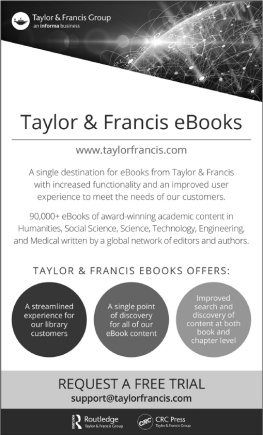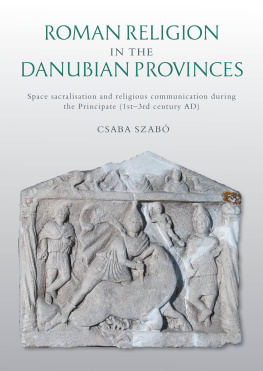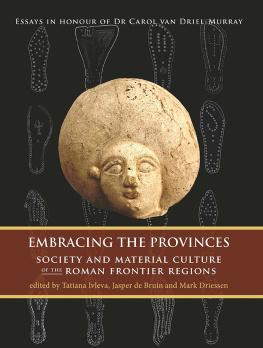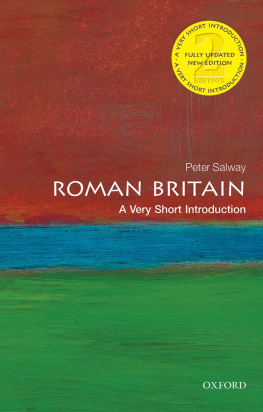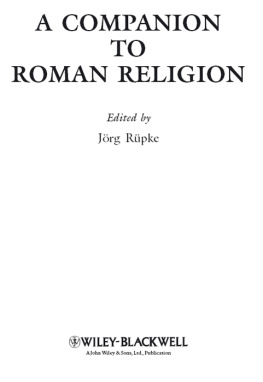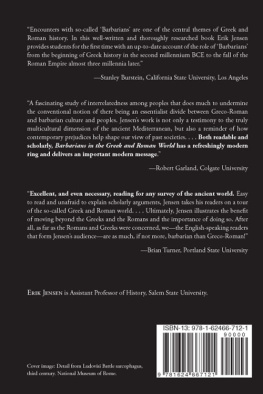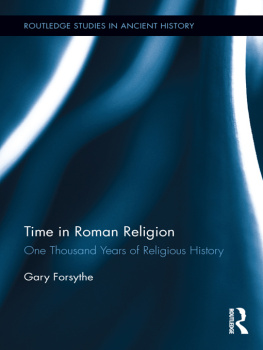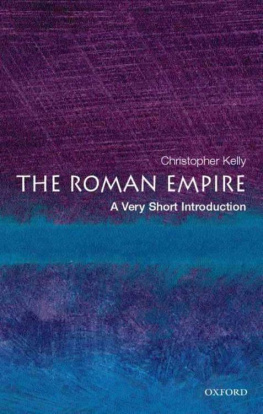The Romans provides an up to date introduction to all of Roman history, vividly illustrated from ancient texts and monuments. It is not just a history of Rome, but an instruction manual on how to do Roman history, packed with the latest research on the eternal city.
Greg Woolf, Director of the Institute forClassical Studies, UK
Splendidly informative and written in a captivating style, The Romans provides a first-rate introduction to Roman history, Roman society, and the Roman world. As the title suggests, The Romans never loses sight of the fact that it is people who make culture. The author not only illuminates her subject for the general reader, but is also alert to the challenge of interpreting ancient evidence, and in so doing does a service for the specialist. This book bridges the gap between them and us and offers a startlingly fresh vision of the ancient world. It also draws attention to ways in which Romes heritage is contested to this day. I know of no better way of discovering the Romans and their enduring place in the world than by reading and re-reading The Romans.
Professor Robert Garland, Colgate University, USA
The Romans
The Romans: An Introduction is a concise, readable and comprehensive survey of the Roman world, which explores 1,200 years of political, military and cultural history alongside religion, social pressures, literature, art and architecture.
This new edition includes updated and revised materials designed to develop analytical skills in literary and material evidence, evoking themes that resonate in both ancient and modern societies: fake news, class struggles, urbanization, concepts of race and gender, imperialism, constitutional power and religious intolerance. The fourth edition incorporates a number of new features and evolving fields:
- A new chapter on provinces, provincial administration and acculturation in the Roman Empire.
- An extended chapter on Christianity and Romes legacy with new case studies in the reception of Roman culture.
- An extended chapter on Roman society and daily life, including recent scholarship on gender and race in the ancient world.
- Integrated use of text and material evidence which is designed to develop analytical skills in critical source assessment.
- The books successful Open Access website updated to include new case studies on emerging topics such as performance politics, religious syncretism, media sensationalism and cultural heritage.
Thoroughly updated and redeveloped, this new edition of The Romans will continue to serve as the definitive introduction to the life, history and culture of the Roman world, from its foundation to its significance to later civilizations.
Abigail Graham has been a Lecturer in Ancient History at the University of Warwick and is currently a visiting fellow at the Institute for Classical Studies in London. She specializes in the epigraphy and monumentality of the ancient world, coordinating epigraphic training courses for the British School at Rome and the Centre for the Study of Ancient Documents (Oxford). In addition to articles, book chapters and media appearances, she has published The Roman Empire: A Brief History (2008) and keeps a blog: CaveatLector:ReadingRome.
First published 2020
by Routledge
2 Park Square, Milton Park, Abingdon, Oxon OX14 4RN
and by Routledge
52 Vanderbilt Avenue, New York, NY 10017
Routledge is an imprint of the Taylor & Francis Group, an informa business
2020 Abigail Graham and the estate of Antony Kamm
The right of Abigail Graham and the estate of Antony Kamm to be identified as author of this work has been asserted by them in accordance with sections 77 and 78 of the Copyright, Designs and Patents Act 1988.
All rights reserved. No part of this book may be reprinted or reproduced or utilised in any form or by any electronic, mechanical, or other means, now known or hereafter invented, including photocopying and recording, or in any information storage or retrieval system, without permission in writing from the publishers.
Trademark notice: Product or corporate names may be trademarks or registered trademarks, and are used only for identification and explanation without intent to infringe.
British Library Cataloguing-in-Publication Data
A catalogue record for this book is available from the British Library
Library of Congress Cataloging-in-Publication Data
A catalog record has been requested for this book
ISBN: 978-1-138-54388-1 (hbk)
ISBN: 978-1-138-54389-8 (pbk)
ISBN: 978-1-351-00558-6 (ebk)
Visit the http://www.routledge.com/cw/romans
To my family and to Eileen and Antony Kamm whose generosity, kindness, and humour have made writing this book such a pleasure.
Friendship improves happiness, and abates misery, by doubling our joys and dividing our grief.
Cicero, Laelius De Amicitia (from Laelius on Friendship)
Antony Kamm, the editor of the first two editions of The Romans (1995 and 2008) left a wonderful legacy that I have tried to continue in the past two editions (3rd edition, 2015). The generous advice and support of his wife, Eileen, who met and corresponded with me, whilst charming and entertaining my family is something that I will never forget. This (4th) edition has aimed to broaden the scope of enquiry to include recent scholarship on emerging topics such as race, gender and sexuality (), though the task of writing a short chapter on this topic seemed almost impossible. In these additions I have also sought to incorporate new finds and resources (e.g. the Bloomberg tablets), with even greater focus on the specific case studies and developing analyses of different types of evidence, attributes that are often acclaimed as transferrable skills.
The Romans website, which continues to add new online case studies, has been designed to offer greater access and opportunities for skill development through online and universally available materials and discussions. It incorporates new didactic tools and websites, to connect the reader with the growing number of resources (I feel as though I have only scraped the surface, however). Please note that online links and resources are constantly in flux, while this is often the herald of development, it can also result in broken links and material that is, at times, unavailable.
In undertaking this project, I am grateful to academics in the USA and the UK who responded to the publishers request for suggestions. I am also especially indebted to my colleagues at the University of Warwick: Alison Cooley, who provided helpful comments and expertise throughout the editorial process, Clare Rowan, who advised on all things numismatic, Kevin Butcher, who provided photos and comments on Palmyra, Elena Giusti, who gave comments on race in Antiquity, and James Davidson, who offered advice on sexuality and gender.
For translations I owe a special thanks to Robert Garland and Bruce Cobbold, who not only gave translations and comments for this work but accomplished something far more difficult: teaching Latin to my adolescent self. My Warwick colleague Clive Letchford is responsible for some of the most artful and engaging literary translations and comments. Many thanks also to Andrew Keller, whose honest and candid critiques have made me and by extension, this work, considerably more enlightened. What links all these men is an admirable love, passion and devotion to ancient languages, which makes them not only inspiring and brilliant teachers, but truly exceptional human beings.

